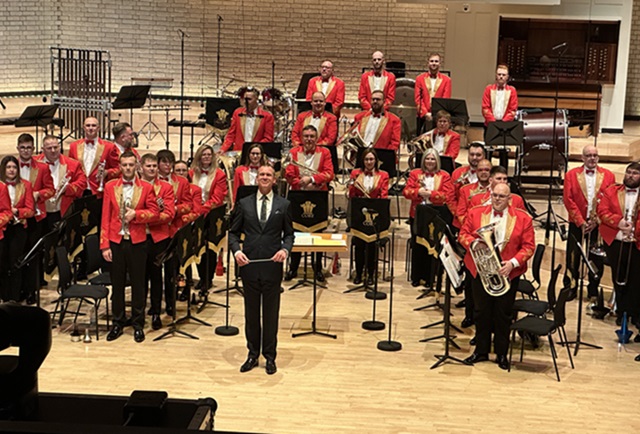

Conductor: Philip Harper
Soloist: Glyn Williams
RNCM International Brass Band Festival
Sunday 28th January
Cory’s substantive Sunday afternoon festival appearance saw them explore connections in time past, present, and potentially future.
There was certainly a timely post lunch caffeine boost with Christopher Bond’s energised ‘Soaring the Heights’ that helped jump-start pulses.
It marked the 50th anniversary of the band’s historic first National Championships success - one achieved in 1974 under the genius of Major Arthur Kenney that sent the band into an orbit of contesting success that it has maintained ever since.
Timeline
Philip Harper’s ‘Euphonium Concerto’ also had a timeline narrative - from July 1916 to 11th March 1917.
Henry Nichols was a Private in the Royal Warwickshire Regiment, one of the millions of Wilfred Owen’s ‘doomed youth’ killed on the battlefields of Northern France in the First World War. His sacrifice was not lost by the passing of generations thanks to the commissioning of the work by his great grandson Micah Dominic Parsons.
Glyn Williams, was the noble, understated memorial voice of the protagonist, sat rather stood at the front of the band in recalling the naïve patriotic optimism that was soon to be replaced by loss and despair as the realities of trench conflict embed themselves into a fearful mind. The final movement was ‘a drawing down of blinds’, ending in tender, commemorative respect.
The final movement was ‘a drawing down of blinds’, ending in tender, commemorative respect.
Other Lives
Fateful happenstance informed Philip Harper’s interpretation of Oliver Waespi’s ‘Other Lives’.
Whether the composer was of the same ‘Sliding Doors’ film mind (his inspiration came from Schubert’s portent of death in ‘Der Doppelganger’) was debatable, but the result was an immensely satisfying interpretation that pivoted on its major/minor midpoint axis with a certainty of musical direction.
the result was an immensely satisfying interpretation that pivoted on its major/minor midpoint axis with a certainty of musical direction.
What the future holds for Mihailo Trandafilovski we will have to wait and see, but his ‘Dance No 1’, a mix of uncompromising textures and technique to create a snapshot of a Macedonian homeland far away in both time and place showcased a compositional voice well worth listening out for again.
Deconstruction
Dorothy Gates’ ‘The Living God’ was a surprisingly forceful deconstruction of apparent certainties that reflected a questioning of her faith following the death of her father. Philip Harper sympathetically shaped the troubled music with finely attuned restraint before the glories of ‘all loves excelling’ prevailed.
The afternoon closed with Philip Sparke’s centenary celebration of Cory’s proud history - ‘The Year of the Dragon’.
It still retains is fiery breathlessness - from the ‘Billy the Kid’ opening salvos of the ‘Toccata’ to the rumbunctious excitement of the ‘Finale’.
However, it was the contrasting beauty of the wonderful ‘Interlude’ that still left the lasting musical impression – the ‘con licenza’ trombone playing of Stephen Sykes and the tenderest ‘calmato’ chorale shaped with informed reserve.
Iwan Fox









